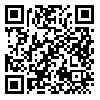Volume 2, Issue 5 (2009)
LCQ 2009, 2(5): 175-195 |
Back to browse issues page
Download citation:
BibTeX | RIS | EndNote | Medlars | ProCite | Reference Manager | RefWorks
Send citation to:



BibTeX | RIS | EndNote | Medlars | ProCite | Reference Manager | RefWorks
Send citation to:
Yahaghi F. Pun; a literary Device, a Visual Device:
a Comparison of Literary and Visual Puns in Animation. LCQ 2009; 2 (5) :175-195
URL: http://lcq.modares.ac.ir/article-29-10934-en.html
URL: http://lcq.modares.ac.ir/article-29-10934-en.html
Animation Art University
Abstract: (8000 Views)
Since arts normally have human sources, they are originally alike and have different forms. Therefore methods of representation in one media, with a little formal change, could be used for the other one. In this research after defining pun as a rhetoric device, its visual equivalents have been dealt with in the world of pictures and particularly in animation. Pun has been defined as: two words are same in form or pronunciation, and different in meaning. Pun is normally used in rhetoric for decoration and make the speech humorous. But in modern semiotic theories, it has been considered as: two similar signifiers with different signified. In this case one can consider two homogeneous visual signs which indicate two different meanings as a visual pun. For instance a picture of a man’s face and a picture of the moon both of which are round. By replacing word and picture we can define visual forms in animation field. In this paper we will offer methodized analysis from visual plays, which might be found heuristically in the artists works.
Received: 2009/04/9 | Accepted: 2009/06/3 | Published: 2010/03/7
| Rights and permissions | |
 |
This work is licensed under a Creative Commons Attribution-NonCommercial 4.0 International License. |








